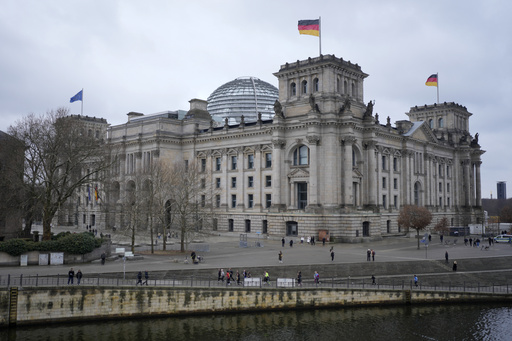BERLIN — German citizens are participating in a pivotal election on Sunday, focused on concerns surrounding the prolonged stagnation of Europe’s largest economy, the need to manage migration effectively, and the uncertain future regarding Ukraine and its relationship with the United States. The center-right opposition party appears to be the frontrunner, while polls indicate that a far-right party could achieve its best performance since World War II.
As the most populous nation within the 27-member European Union and a key NATO member, Germany plays a significant role in addressing various global challenges. It has been a substantial arms supplier to Ukraine, second only to the U.S., making its stance crucial as Europe grapples with potential political shifts, especially in light of the U.S. administration’s confrontational stance on foreign policy and trade.
The leading candidates in the election, conservative Friedrich Merz and current Chancellor Olaf Scholz from the Social Democrats, cast their votes shortly after one another in distinct areas of the country on Sunday morning.
What is at stake in this election?
Over 59 million individuals are eligible to vote in Germany, which has a total population of 84 million. They will select representatives for the 630 seats in the Bundestag, the lower house of parliament, which convenes in the iconic Reichstag building topped with its glass dome.
Germany’s election system frequently results in no party receiving an outright majority, and that trend seems to be continuing this time. Speculation suggests that it will take two or more parties to create a coalition, a process expected to involve challenging negotiations lasting weeks or even months before a new Chancellor can be confirmed by the Bundestag.
This election, originally scheduled for later, has been moved up by seven months after Chancellor Scholz’s center-left coalition disbanded in November following a term marred by factional disputes. There is considerable dissatisfaction among the electorate and limited enthusiasm for the candidates on the ballot.
Who are the likely successors?
Friedrich Merz’s Union bloc has consistently led preferences in the polls, securing 28-32% support in recent surveys, making him the leading candidate to take over from Scholz. In contrast, Scholz’s party is polling between 14-16%, potentially resulting in its worst outcome since World War II in a national election.
The far-right, anti-immigration Alternative for Germany (AfD) is in a strong position, polling at roughly 20%—a notable increase from its previous best performance of 12.6% in 2017. Alice Weidel represents the party as its first chancellor candidate. However, consensus among other parties is to refrain from any collaborations with AfD, a policy known as maintaining a “firewall.”
The environmental Green Party is also in the race, spearheaded by outgoing Vice Chancellor Robert Habeck, although they currently trail behind Scholz’s Social Democrats in polls.
Merz has promised “stability instead of chaos,” referring to the dysfunction that plagued Scholz’s coalition. However, uncertainty remains about whether Merz can form a stable government able to deliver improvements. He hopes for a two-party coalition but might need a third partner for support.
Potential allies for a Merz administration could include Scholz’s Social Democrats, the Greens, or the Free Democrats, who were part of the previous coalition but might struggle to retain seats in parliament. The Free Democrats and another small party are currently around the 5% mark required to gain parliamentary representation, adding to the uncertainty surrounding coalition formations.
What are the pressing issues?
Candidates are presenting contrasting strategies to revive the stagnating German economy, which has encountered declines in recent years. Revitalizing economic growth will be a high-priority task for the incoming administration.
In recent weeks, the issue of migration has surged to the forefront of the campaign following incidents of violence linked to immigrants. Merz has pledged to enhance border security, emphasizing the need to prevent entry by those without proper documentation and to increase deportations if elected chancellor. He has also put forth a nonbinding motion urging the government to expand the number of migrants turned away at Germany’s borders, which narrowly passed with AfD support—a first in postwar Germany.
Competitors have raised concerns over Merz’s alliance with AfD, which has sparked protests. Scholz accused Merz of “irresponsible gambling” and breaching a longstanding political taboo. Nevertheless, Merz has categorically rejected any partnership with AfD, insisting that his party will “never” engage with them.
Mainstream political factions have committed to maintaining support for Ukraine amid its ongoing conflict with Russia. Following Scholz’s achievement of NATO’s defense spending target of 2% of GDP, the new government will face the challenge of sustaining this level of investment and likely increasing it, aligning with U.S. expectations, especially after a dedicated 100 billion euro fund intended for military modernization is depleted by 2027.




